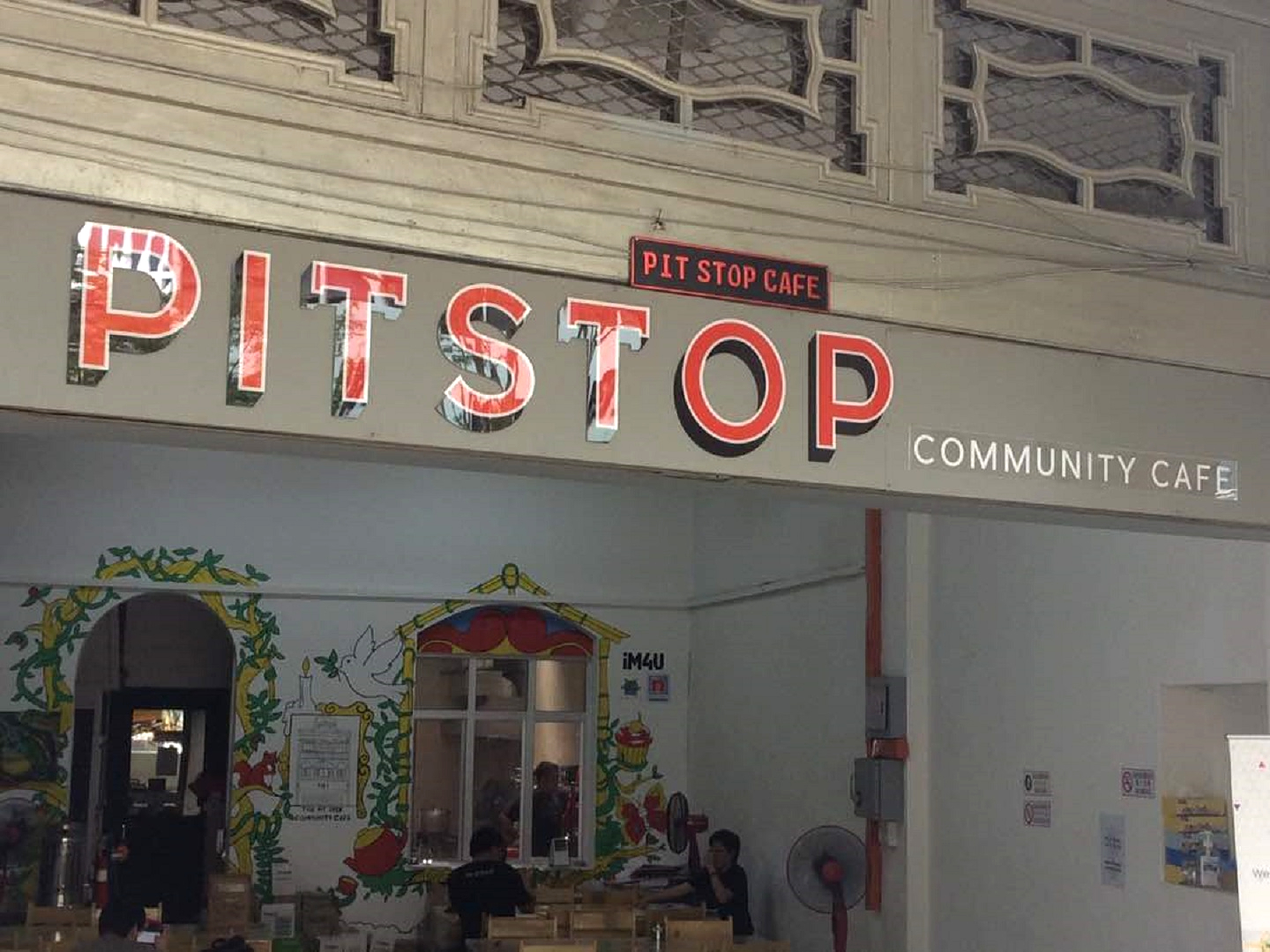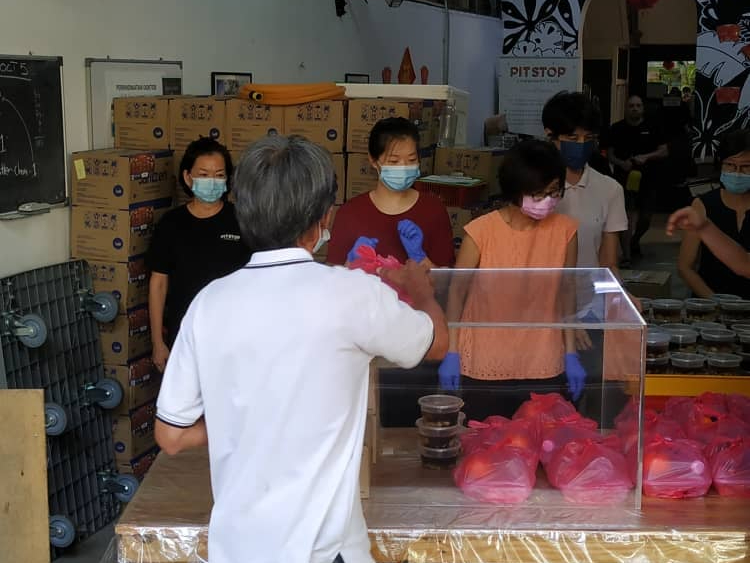
Pit Stop Community Café is a social enterprise that has been working towards solutions for homelessness, urban poverty and hunger for years (All photos: Pit Stop Community Café)
The extended lockdown has stretched society extremely thin, with some to the point of snapping and others to great exhaustion. As cases rise in the heart of the city, the risk of contracting the virus in relation to anything that involves leaving home increases proportionately. But for those who don’t have a home to begin with or are living in poverty, the strain and struggle is tenfold.
There are many communities that are teetering on the brink, as the recent rakyat-led White Flag movement has highlighted. In June, founder of Refuge for the Refugees Heidy Quah posted on social media about the overwhelming messages she received from families in need of food aid, and it went viral. The load was more than what her team could accommodate, and the decision of who gets to eat for the week was and still is sobering.
However, Quah isn’t the only one tyring to fill the gaps of social welfare. The same sentiment is echoed across those behind soup kitchens, food banks, NGOs and social enterprises who are serving the urban poor and marginalised communities. And while they might not be labelled as frontliners, they’re very much in the thick of the battlefield and are, in other ways, keeping people alive.
pit_stop.jpg

Pit Stop Community Café is a social enterprise that has been working towards solutions for homelessness, urban poverty and hunger for years. Their dinner service has fed anyone who approached their doorsteps — regardless of gender, race or religion — and they’re still doing the same amidst the pandemic, except now with only the core team and without volunteers to reduce the risk of Covid-19 infection.
“We try to give as balanced as a meal as possible four days a week,” says co-founder Joycelyn Lee. “But that is just one arm of many tentacles at this point in time.” Previously, Pit Stop’s dinner service operated for six days but it has been reduced as there were other parties who also dropped off food.
“We did not want to add to the food waste,” she explains. Pit Stop is big on food rescue. They work with soup kitchens and food banks to redistribute food that would otherwise have gone to the landfill and act as a bridge between donors and beneficiaries by managing and organising the distribution. “In other countries, people pay for the service,” she says. “But for now, we do this for free because it is necessary.”
Since they don’t earn funds from being a facilitator, they rely on Pay Forward meals. “What people are doing is they are paying for other people to eat,” she explains. “And then, of course, there are various households and communities that get in touch with us.”
Pit Stop has been distributing food packs way before the White Flag movement came around and what sets them apart is their effort in customising the packs according to the needs of each household. They take into consideration the number of family members, children and if they possess cooking equipment or a refrigerator to store food. They also prioritise nutrition and follow the World Health Organisation and United Nation’s Food and Agriculture Organisation’s guidelines to curate items a family would need, including sufficient grains, greens and fruits as well as food with longer shelf-life.
While it would be easier on the pocket to purchase imported produce and food items, Pit Stop is adamant on buying ingredients from local wholesalers and farmers. “It’s a way of plowing back into the economy,” Lee says. The fresh produce will be included in the pay-it-forward Veggie Boxes of which donors can contribute to for families in need. “It’s not just the family that you’re helping that gets the Veggie Box. It’s the wholesalers and farmers that stay in business.”
Another tentacle (as Lee puts it) extends help to welfare homes, orphanages, old folks’ homes and shelters for marginalised communities. She explains that a lot of homes and shelters depend on ad hoc donors who drop off essentials once in a while, but since there is the Movement Control Order, people cannot go now. And regular contributors who faced pay cuts from their jobs unfortunately cannot donate anymore.
“So we support about 18 homes on a fortnightly basis, where we provide anywhere from 40 to 70% of their food needs,” she says. “And the rest on a more ad hoc basis. When their food stocks drop, we check in. So that’s maybe once a month. When we go in and we provide them with rice, fresh vegetables, sardines, whatever — it means money saved on buying food. And that money can go towards paying utilities for instance.”
pit_stop.jpg

Despite supporting so many communities, Pit Stop is also looking out for our diligent frontliners. Due to restrictive operation hours, restaurants and convenient stores can only operate until 8pm, which makes things difficult for essential workers with night shifts. “When people think about frontliners, we think about medical frontliners, we think about PDRM doing the road blocks and all that but people forget that when a place needs sanitisation, our bomba boys are the ones going in,” says Lee.
Currently, Pit Stop keeps watch over a total of eight stations to make sure the firefighters keep their nose above water. “So what we do is, we provide them with some raw staples and basics like rice, onions, potatoes, canned sardines — anything they can prepare with minimum fuss.”
If the pandemic has welled up a sense of fear, anxiousness and uncertainty among us, the emotions are tangible on the ground. The past year and a half have been trying for folks like Lee and Quah, who are putting the welfare of others above their own.
“It’s not new to us and something all of us go through,” Lee grieves. “We’ve been playing god for the last 16 months. If I only have, say 50 veggie boxes and this amount of funds, but I count 100 white flags, which of those white flags would I help?”
Support Pit Stop Community Café’s work by sponsoring hot meals or raw food here.
If you would like to contribute cash, please direct them to:
PSCC Resource Ventures Sdn Bhd
Maybank: 5143-1060-8247
Verification email: [email protected]
Reference: #pitstopdinnerservice for hot meals, #pssurvivecovid for running costs or #earthangelsofpitstop if you don't mind either way.


